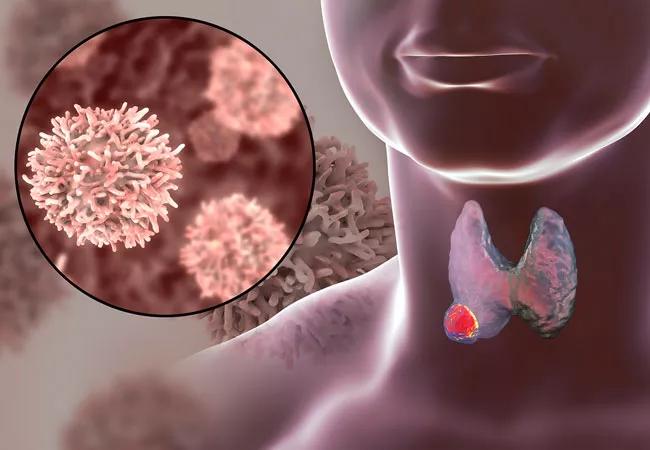How Cleveland Clinic is contributing to the future of care

written by Joe Scharpf, MD, FACS
Advertisement
Cleveland Clinic is a non-profit academic medical center. Advertising on our site helps support our mission. We do not endorse non-Cleveland Clinic products or services. Policy
As the worldwide incidence of thyroid cancer has increased, it has generated much debate and study concerning the proper evidence-based management strategies. This increase in thyroid cancer, overall, has fortunately not resulted in an increase in mortality from thyroid cancer.1 However, advanced, invasive thyroid cancers continue to represent the primary cause of thyroid cancer-specific death, and these aggressive thyroid cancer variants result in significant morbidity for patients. Morbidity from primary and recurrent treatment for these cancers is not inconsequential, and it is often not captured in outcomes studies. In addition to treating all patients suffering from thyroid cancer, we have dedicated considerable focus in our Head & Neck Institute at the Cleveland Clinic on this subset of patients.
A multidisciplinary endocrine clinic has been established with the support of Dr. Patrick Byrne, Chair of the Head & Neck Institute, Cleveland Clinic Foundation along with Christian Nasr, MD, and Mario Skugor, MD. This affords us the opportunity to have direct interactions beyond both our standard head and neck tumor board and our separate multidisciplinary thyroid cancer tumor board to treat complex patients. Although guideline development can be difficult for these more uncommon tumors,2 we have been instrumental in contributing to an American Head and Neck Society Consensus Statement.3 Our multidisciplinary approach has utilized advanced surgical techniques 4-6 complemented when appropriate with radiation and targeted therapies to achieve locoregional control in the settings of airway invasion (Figure 1) and threat of organ preservation (Figure 2).
Advertisement
Our surgical team within the Head & Neck Section is comprised of expert, fellowship-trained head and neck surgeons and includes Brandon Prendes, MD, Eric Lamarre, MD, Jamie Ku, MD, our new addition of Natalie Silver, MD, and myself. As a group, we have placed a particular emphasis on the safety profile of surgery utilizing intraoperative nerve monitoring (IONM), and a couple of the society guidelines on neuromonitoring in the setting of thyroid surgery have been invaluable for our team. These include the International Neuromonitoring Study Group (INMSG) and its two-part guidelines.7,8 The Cranial Nerve Monitoring Task Force (CNMTF) of the American Academy of Otolaryngology, Head and Neck Surgery, which I chaired, also released a Position Statement from the AAO-HNS and culminated in the AAOHNS Cranial Nerve Monitoring Task Force Report.9,10 I am also finishing up on what will be the first book of its kind dedicated solely to intraoperative cranial nerve monitoring in head and neck surgery.11 My hope is that it will serve as a reference for contemporary advances in nerve monitoring and hopefully inspire further work in this very important area.
The Head and Neck Institute will be a leader for the Cleveland Clinic as a participating site member for a multicenter anaplastic neoadjuvant clinical trial utilizing dabrafenib, trametinib, and pembrolizumab before surgery in treating patients with BRAF V600E-mutated anaplastic thyroid cancer (NCT # 04675710). Recognizing the need for expedient care for this subset of patients, our multidisciplinary team offers immediate same-day appointments for patients and for referring doctors. This is critical to evaluate the patient’s airway stability, determine potential for surgical resection, and obtain tissue so that it may be interrogated for mutations that could be targeted for the aforementioned treatment potential.
Advertisement
Novel treatment strategies discovered through research will be critical to further advances. We are fortunate to be able to collaborate with Jeffrey A. Knauf, Ph.D., who was recently recruited to the Cleveland Clinic Lerner Institute as a Staff Scientist. For the past 26 years, Dr. Knauf’s research has focused on understanding the biology of thyroid cancer. Past research identified the cause of resistance to radioactive iodine therapy 13-15 which led to improvements in the response of thyroid cancer patients to radioactive iodine therapy. 16 His recent research includes mouse models of advanced thyroid cancer to investigate mechanisms of resistance to drugs targeting oncogenic BRAF17 and more recently to explore treatment of advanced thyroid cancers with immunotherapy alone or in combination with BRAF inhibitors. In addition to her clinical responsibilities, Dr. Natalie Silver will have a primary role in advancing care through her research efforts. Dr. Silver’s lab is developing personalized RNA nano-vaccines against thyroid cancer. Preliminary results are promising, and demonstrate vaccine efficacy in murine models of metastatic thyroid cancer. The goal is to translate these findings into human clinical trials.
The future of care for patients afflicted with aggressive thyroid cancer is certainly very promising, and our group is excited and honored to be a contributing part of it.
Dr. Scharpf is the Director of Head & Neck Endocrine Surgery at Cleveland Clinic’s Head & Neck Institute, and a professor of otolaryngology-head and neck surgery at Cleveland Clinic’s Lerner College of Medicine. He also serves as the Chair, Endocrine Surgery Committee, American Academy of Otolaryngology – Head and Neck Surgery.
Advertisement
Advertisement
Advertisement

Radiation therapy helped shrink hand nodules and improve functionality

Standard of care is linked to better outcomes, but disease recurrence and other risk factors often drive alternative approaches

Phase 1 study demonstrates immune response in three quarters of patients with triple-negative breast cancer

Multidisciplinary teams bring pathological and clinical expertise

Genetic variants exist irrespective of family history or other contributing factors

Study shows significantly reduced risk of mortality and disease complications in patients receiving GLP-1 agonists

Structured interventions enhance sleep, safety and caregiver resiliency in high-acuity units

Addressing rare disease and challenging treatment course in an active young patient